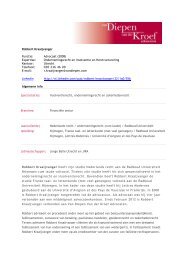© Van Diepen Van der Kroef Advocaten
© Van Diepen Van der Kroef Advocaten
© Van Diepen Van der Kroef Advocaten
- No tags were found...
You also want an ePaper? Increase the reach of your titles
YUMPU automatically turns print PDFs into web optimized ePapers that Google loves.
100. Even where the District Court had held that international practice entailed an absoluteimmunity for the United Nations, the District Court should still have reviewed whether theresult in the present case was just. The facts set out in the originating writ of summonsshow that this is an exceptional case. To the extent that any case can be dismissed byreference to general rules, the District Court should not have done so in the present case.An actual review should indeed always be conducted. International discussion has followedthe disputed judgment of the District Court to the effect that insofar as an absoluteimmunity for the United Nations might already exist, international practice would benefitfrom an outcome that was different to that given by the District Court.There has also been heavy criticism of the judgment of the District Court in the Netherlands(see for example C.M. Schrijnen, Immuniteit van het UN, NJB, 2008, pp. 1801-1802).101. The upshot of the above is that the immunity of the UN is not absolute. The District Courtshould have reviewed whether there existed in the present case a functional necessity forimmunity. There is no room for a functional necessity for immunity of the UN in the case ofgenocide. Moreover, a weighing of interests should have been conducted. Genocide operatesas the most compelling reason, with the result that no immunity should be accorded. Inaddition, the District Court failed to review against the Vienna Convention on Treaties, areview that must have led to the conclusion that according immunity in this case would haveled to a clearly absurd and unreasonable result. Furthermore, the District Court erroneouslyfailed to take the judgment of the CAVV into consi<strong>der</strong>ation in its decision.Finally, the District Court has based itself on non-existent international practice while suchpractice ought not to apply as an absolute norm.Ground of appeal 8102. The District Court has erroneously consi<strong>der</strong>ed un<strong>der</strong> legal consi<strong>der</strong>ation 5.14 that:‘The Court dismisses the argument of the Association et al. that, as evidenced by therestrictive subordinate clause “as are necessary for the fulfilment of its purposes” inArticle 105 paragraph 1 of the UN Charter, the immunity of the UN only exists in thoseinstances in which the domestic court addressed – in this case, a court in the Netherlands –actually consi<strong>der</strong>s the allegedly culpable acts and omissions of the UN as “necessary”. In<strong>©</strong> <strong>Van</strong> <strong>Diepen</strong> <strong>Van</strong> <strong>der</strong> <strong>Kroef</strong> <strong>Advocaten</strong> page 44 of 99
















